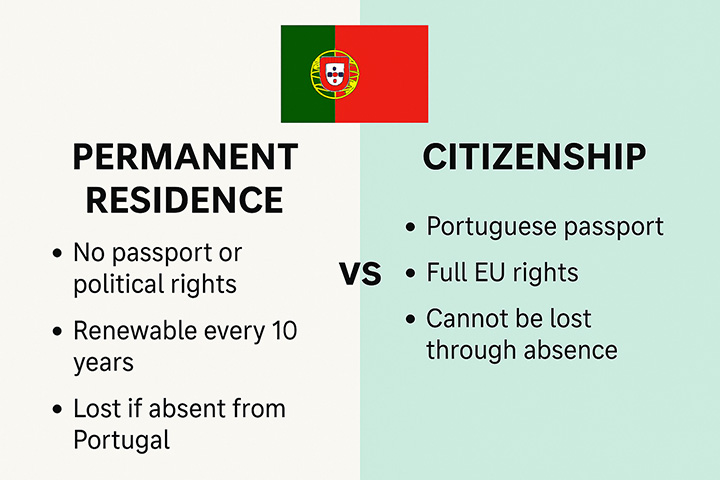What's the difference between Permanent Residency and Citizenship

?? What Are We Talking About?
Permanent Residency (PR) means long-term legal permission to live in Portugal. It doesn’t grant you a passport, EU freedoms outside Portugal, or political rights.
Citizenship, on the other hand, is nationality. It provides full rights as a Portuguese and EU citizen—passport, travel, work across the EU, voting, and more
How You Qualify
Permanent Residency
-
Must hold legal temporary residency (e.g. D7, D2, studies, Golden Visa) for 5 years. At that point, you may apply
-
Requires proof you speak Portuguese at A2 level (non‑EU/EEA nationals)
-
Must meet basic stay requirements (don’t stay abroad more than 2 years consecutively or 30 months within 3 years)
-
Valid for 10 years and renewable
Citizenship
-
Traditionally required 5 years of legal residence and Portuguese proficiency
-
Proof of good character, integration, cultural knowledge.
-
Upon approval: issued a Portuguese citizen card and passport; eligible to vote and work in EU
? New Proposed Changes (June 23, 2025)
Portugal’s government has introduced a draft law to extend the residency requirement for citizenship:
-
10 years of legal residence for most applicants
-
7 years for citizens of Portuguese-language countries (CPLP)
-
Demonstrable knowledge of Portuguese language, culture, democratic rights & duties
-
Additional vetting: family reunification rules tightened; potential revocation for serious crimes
Minister António Leitão Amaro described it as reinforcing applicants' effective connection to Portugal through a language and culture exam
Note: These are draft proposals; final approval requires parliamentary vote (seeking two-thirds majority, supported by Chega). It may take months before the law is enacted
Similarities
Similarities
| Feature | Permanent Residency | Citizenship |
|---|---|---|
| Pathway eligibility | After 5 years | After min. 5 years, soon likely 10 |
| Portuguese language A2 | Required (non-EU) | Required |
| Right to live/work in Portugal | Yes | Yes |
| Travel within Schengen | Up to 90 days in other Schengen countries | Unlimited travel, live/work anywhere in EU/EEA |
| Dual citizenship allowed | Yes | Yes — but citizenship gives more rights |
Key Differences
|
Feature |
Permanent Residency |
Citizenship |
|
Portuguese passport |
❌ Not granted |
✅ Fully eligible |
|
EU freedom of movement/living |
Tourist stays only |
Full rights across EU Digital Émigré+1Wikipedia+1 |
|
Voting in national elections |
❌ No |
✅ Yes |
|
Standing for public office |
❌ No |
✅ Yes |
|
Renewal/Bureaucracy |
Renew residence every 5 years* |
Once granted, no renewal |
|
Risk of loss |
Yes—due to long absences or non-compliance |
Very low—only by renunciation or revocation for serious crimes |
|
Time to gain |
Stable after 5 years |
Extension may mean 10-year wait for most |
* According to Article 76 of the Portuguese Immigration Law: The permanent residence permit itself does not have an expiration date. However, the residence card must be renewed every five years, or whenever there is a change in the personal details registered on the card. So while the residency rights are indefinite, the physical document must be updated periodically.
Why Choose PR Over Citizenship?
-
Flexibility: If your home country forbids dual citizenship, PR keeps your birth nationality intact.
-
Simpler: Less paperwork, no need for a passport application.
-
Fast access: After five years, you gain EU/residence benefits without waiting longer for citizenship.
Example: A US citizen may wish to keep their US passport for tax or personal reasons—PR is a solid choice
Why Choose Citizenship?
-
EU passport: Open travel, work, live in all EU/EEA countries and Switzerland.
-
Political rights: Vote in elections and represent in public office.
-
Stability: You won’t need to renew documentation, and cannot easily lose status.
For UK nationals seeking to restore EU rights post-Brexit, or those ready to fully integrate, citizenship remains optimal
⏳ What the Proposed Delay Means
-
If approved, new applicants would typically wait 10 years (or 7 years for CPLP nationals) before becoming eligible for citizenship.
-
PR applications continue under current 5-year rule.
-
Those already with PR or in process would be grandfathered under the old 5-year threshold—but anyone starting from now may be affected.
-
It deepens the divide between PR and citizenship in terms of timeline and required integration
-
We are hoping the changes in the law will not impact existing residence permit holders retroactively, but we will only know around September 15, 2025 if that's the case. Stay tuned.
In Summary
-
Paths diverge after 5 years:
-
PR = you stay in Portugal with fewer rights but simpler upkeep.
-
Citizenship = full EU mobility and rights, but possibly delayed to 10 years.
-
-
New law seeks to tighten naturalisation by doubling residency for most and adding cultural integration tests.
-
Decide based on your goals:
-
Want an EU passport and political rights? Go for citizenship.
-
Prefer to keep your original nationality with modest hassle? Permanent residency works, especially now.
-
? Final Thoughts
-
Existing 5‑year PR applicants should continue their route—as PR and citizenship remain on standard timelines until the law enters force.
-
Planning long-term, be ready: citizenship may require 7 to 10 years under the pending law.
-
Stay informed: We’ll know more once the bill passes in parliament. Keep an eye on updates this year.


